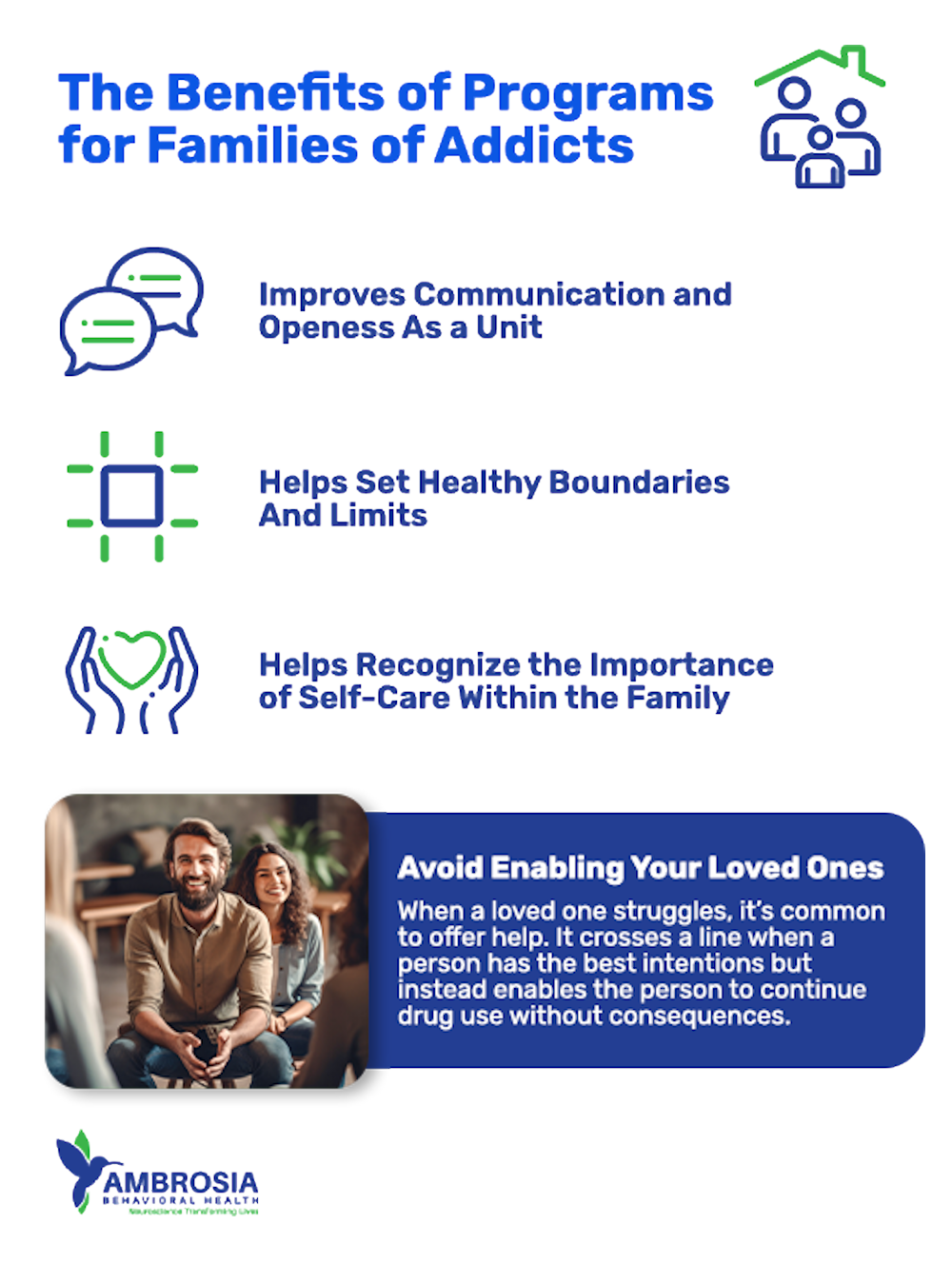Family Therapy
When a person goes into treatment, their family can benefit from understanding the unhealthy ways they’ve coped with their loved one’s addiction. Programs for family members of addicts can help families and their struggling loved ones throughout the recovery process.

This is why Ambrosia in South Florida offers family therapy sessions and family programming. With the right resources and support from a professional and compassionate family therapist, family units can find the healing they need to move forward.
A family therapy program for addiction involves the entire family in the recovery process. Addiction is a disease that impacts important relationships in a person’s life. Families might adopt poor communication and unhealthy coping skills while living with an addicted family member.
Family therapy for substance abuse treatment helps families learn effective ways to communicate and express their feelings. Some family members, especially children, assume that they are responsible for their loved one’s addiction. They might hold their feelings inside and never learn to communicate their needs within the family. Family therapy can help address these often unseen issues.
Family Behavior Therapy (FBT) is a cost-effective, evidence-based treatment that uses innovative and easily learned behavioral therapies to achieve goals within a family context. It typically involves 12 to 16 outpatient sessions, each lasting about 60 to 90 minutes, throughout 4 to 6 months. FBT aims to optimize thoughts and behaviors, helping with mental health, family relationships, sobriety, substance management, employment, sports performance, self-protection, and home safety. The therapy includes a strategy to enhance participation and involves a series of assessments to tailor interventions to the family’s needs.
Functional Family Therapy (FFT) is an intensive, short-term therapeutic model that provides in-home family counseling. It addresses behaviors such as curfew violations, running away, truancy, and juvenile delinquency from a relational, family-based perspective. FFT aims to improve family relationships by assessing family dynamics, modifying communication, enhancing parenting skills, and supporting positive reinforcement within community contexts. The therapy typically involves weekly sessions over 3 to 6 months and includes all key family members. The FFT model comprises five phases: Engagement, Motivation, Relational Assessment, Behavior Change, and Generalization.
Brief Strategic Family Therapy (BSFT) is an evidence-based practice designed to treat externalizing and internalizing symptoms in youth aged 6-18 by restructuring problematic family interactions. It uses a structured, problem-focused, and directive approach to address issues like substance abuse, truancy, and bullying. BSFT involves identifying and changing maladaptive family interaction patterns to encourage positive behavior. The therapy typically consists of 12-17 weekly sessions, each lasting 60 to 90 minutes, and includes strategies like joining, diagnosis, and restructuring to improve family dynamics. BSFT is culturally competent and has been adapted for various populations and settings.
Multi-Dimensional Family Therapy (MDFT) is a family-centered treatment designed to help youth aged 10-26 who face challenges such as substance misuse, mental health issues, crime, delinquency, and family problems. MDFT aims to improve communication, daily functioning, and family cohesion. It addresses mental health symptoms, aggressive behavior, and negative peer relationships while enhancing school performance, family stability, and positive peer interactions. MDFT involves collaborative interventions that promote change within the youth, their family dynamics, and their interactions with the community. The therapy is widely implemented in various settings across the U.S. and Europe.
Community Reinforcement and Family Training (CRAFT) is an approach designed for families with a loved one struggling with substance use who is not interested in seeking help. CRAFT focuses on teaching families how to communicate positively, use positive reinforcement, and prioritize self-care. It aims to make sober behavior more rewarding for the loved one than substance use. CRAFT is a flexible, behavioral approach that adapts to the family’s needs and is more effective than traditional methods like 12-step programs, with a higher rate of encouraging loved ones to seek treatment.
Multisystemic Therapy (MST) is an intensive, family-focused treatment model for adolescents aged 12 to 17 who exhibit high-risk behaviors, including criminal activity and substance abuse. MST aims to promote pro-social behavior and reduce criminal activity, mental health issues, and substance use by addressing the core causes of delinquent and antisocial conduct. The therapy involves personalized intervention strategies based on an ecological assessment of the youth, their family, and their community. MST is typically delivered over 3 to 5 months, with services available 24/7, allowing for timely crisis management and flexible scheduling.
Solution-Focused Brief Therapy (SFBT) is a short-term, goal-focused therapeutic approach that emphasizes constructing solutions rather than focusing on problems. Developed by Steve de Shazer and Insoo Kim Berg, SFBT is future-oriented and aims to elicit positive emotions and hope. It involves identifying clients’ goals and exploring past successes or “exceptions” to develop practical solutions. SFBT is widely used in various fields, including mental health, education, and social services, due to its effectiveness and brevity. It focuses on clients’ strengths and resources to facilitate positive change among family members.
The various types of family counseling all work to resolve family problems and family dysfunction as they relate to substance abuse. They also seek to provide support for the family members of those who are struggling with substance abuse.
What are the Stages of Family Therapy?
- Initial Stage: Assessment and Goal Setting
- The therapist evaluates family dynamics and identifies key issues.
- Collaborates with the family to establish clear objectives.
- Middle Stage: Intervention and Skill-Building
- Families engage in activities to enhance communication and conflict resolution.
- Focus on developing therapeutic techniques for healthier interactions.
- Final Stage: Consolidation and Termination
- Review of progress made during therapy.
- Development of strategies for sustaining improvements.
These stages collectively help families achieve lasting positive changes by addressing underlying issues and reinforcing newly developed skills.

What are the Benefits of Family Therapy for Addiction?
Family therapy enhances family communication by employing techniques such as active listening, open dialogue, and conflict resolution. These strategies help family members listen empathetically, express thoughts and emotions freely, and manage disputes constructively, leading to stronger relationships and fewer conflicts. In the long term, improved communication fosters greater family cohesion, resilience, and individual well-being, creating a supportive environment where all members feel understood and valued.
Family therapy assists families in setting boundaries and limits by using techniques like enhancing communication skills, clarifying roles, and facilitating negotiation. These strategies enable family members to express needs and expectations clearly, define personal and shared responsibilities, and reach mutually agreeable solutions. Healthy boundaries improve relationships by reducing misunderstandings and conflicts fostering respect and cooperation. Over time, these practices lead to stronger family dynamics and individual well-being, as family members feel more secure and supported in their roles.
Family therapy helps families recognize the importance of self-care by incorporating techniques like stress management, prioritizing personal time, and encouraging healthy habits. These practices enable family members to manage stress effectively, find time for personal interests, and adopt routines that promote physical and mental health. Emphasizing self-care leads to improved mental well-being and a stronger family system by fostering a supportive environment where each family member feels valued and rejuvenated. In the long term, prioritizing self-care enhances family dynamics and individual resilience, allowing families to thrive together.
Family therapy plays a crucial role in helping families rebuild trust in relationships by employing techniques such as open communication, empathy exercises, and accountability practices. Through family therapy, members learn to express feelings honestly, understand each other’s perspectives, and take responsibility for past actions, which are essential steps in restoring trust. As trust is rebuilt, family members experience stronger bonds and fewer conflicts, creating a more harmonious environment. Over time, the impact of family therapy extends beyond immediate relationships, fostering healthier family dynamics and enhancing individual well-being, as each member feels valued and secure.
Family therapy significantly aids families in achieving better outcomes in long-term recovery by utilizing techniques like collaborative goal setting, emotional support, and relapse prevention strategies. Through family therapy, members work together to establish shared recovery goals, provide mutual support, and develop strategies to prevent relapse. This collaborative approach in family therapy not only strengthens family cohesion but also promotes sustained sobriety, ensuring that each family member feels supported throughout the recovery journey. In the long run, family therapy enhances family dynamics and individual well-being, creating a nurturing environment for lasting recovery success.


Family Therapy Can Help Address Codependency
Codependency can be part of a relationship between someone who has a substance use disorder and a loved one. The codependent family member often identifies as a “giver” and enjoys feeling needed by the person they rely on, even when they provide things that are ultimately unhealthy for them. The person with the addiction — and accompanying mental health issues — fills the role of the “taker.” They continue their addictive behaviors because the codependent family member offers them excuses and protection.
Ryan Potter, MSW, MCAP, ICADC, and Director of Clinical Development for Ambrosia Treatment Center, explains further:
“They have good intentions, trying to take care of a person who is struggling, but the caretaking becomes compulsive and defeating. When codependents place other people’s health, welfare, and safety first, they lose contact with their own needs, desires, and sense of self. The addict, who can and should be taking care of themselves, has less confidence in their resiliency and capabilities and fewer motives to change their behavior.”
Family Therapy Can Help Address Enabling Behaviors
When a loved one struggles, the natural inclination is to offer help. It crosses a line when family members have the best intentions but instead, enable the person. What initially feels helpful protects someone from consequences that motivate them to change and seek addiction treatment.
If you are unsure whether or not you enable a loved one, ask yourself if you do any of the following:
- Ignore things they do that are dangerous and sustain their addiction
- Keep their problems a secret from others
- Lie and offer excuses for the person
- Blame other people and situations for the person’s addiction or behaviors
- Avoid talking about drugs or alcohol with them
- Provide drugs or alcohol to them
- Prioritize their needs over your own
- Act out of fear of what may happen if the loved one has to take responsibility for their actions.
- Feel resentment towards the loved one but still enable them
- Hope or assume that the situation will get better on its own

How Does Family Therapy Support Other Forms of Therapy for Addiction?
How Long Does Family Therapy Last?
When Should Family Therapy Not be Used in Treatment?
Communication During Family Therapy Sessions
Talking to Your Loved One
Talking daily is not healthy. It becomes a distraction for them to immerse themselves in the treatment environment. They need to form their own opinions and deal with sensitive emotions (like shame for hurting you). They’re here to talk with trained therapists and peers to build support networks and get to the root of the issue.
They may express a desire to leave early at some point during their addiction treatment journey. This is not a good sign. Instead of buying into their story right away, take some time to think and gather the facts. Speak to their therapist to get a clearer picture of what’s in the best interest of your loved one. No matter how “bad” circumstances are that they describe, you should never help or encourage them to leave early without an immediate plan for continued treatment.
You can contact the facility at any time. However, you will not be immediately connected with your loved one. Even in emergencies (like the death of a loved one), therapist approvals ensure things are communicated and planned for in the best possible way.
Talking with Us
Your loved one and HIPPA regulations dictate if and what we can communicate with you. If communication is lax on our part, they may not have signed a release or designated someone else as the primary contact. The therapist will only call the primary contact. That person should update all other family members.
They can revoke their consent at any time. This usually means they want to keep important information from you, and this is not a good sign. We‘ll do our best to convince them to keep communication open. As frustrating as it is, they control the communication of their treatment (by law).
Both Wellness and their therapist will contact you once a week with an update, pending a release being signed. If you do not hear from the therapist within one week, please call the facility. To provide the highest level of care for each client, therapists cannot be on the phone with loved ones all day.
No news is good news. You’ll be informed if your loved one is admitted to a hospital or leaves treatment early. Instead of worrying when you don’t hear from us, remember it means they’re actively in addiction treatment.
Family Therapy for Addiction at Ambrosia

Engaging Speakers
From the outside, substance abuse is difficult to understand. Spend a half day learning more about the disease and your role in recovery.
Personal Exercises
Start to communicate your feelings in a group or private family therapy session available on Friday or Monday, scheduled with the therapist.
Visiting Hours
After the session each day, they can get a pass to spend the afternoon with you. In some cases, even off-site. Use the time to relax and reconnect.Facility Contact Info
Port St. Lucie, FL
Facility Phone — (772) 323-2099
Facility Address:
546 NW University Blvd Suite 103 Port St. Lucie, FL 34986
Singer Island, FL
Facility Phone — (561) 721-8800
Facility Address:
2626 Lake Drive, Singer Island, Florida 33404
Find the Support Your Family Needs at Ambrosia
If someone you love is suffering from alcohol or drug abuse, your whole family has likely been suffering from family conflict, emotional challenges, mental health struggles, and more difficulties. Substance abuse affects the family system in many ways and can make life incredibly challenging for the family members of suffering individuals. But there is hope.
With help from family support groups and family counseling services here at Ambrosia in South Florida, families can explore substance use disorder treatment options for their struggling loved ones while also getting the help and healing they need.
Family therapy helps reduce stress, improve communication skills, resolve family issues, improve emotional regulation, and increase the overall well-being of the family unit. To learn more about our family programming, contact our admissions team today. Let us help your family heal!
Those struggling with addiction and their families can learn how to heal with our family program for addiction. Call us today or visit our admissions page to learn more.
https://familybehaviortherapy.faculty.unlv.edu/what-is-family-behavior-therapy/
https://preventionservices.acf.hhs.gov/programs/208/show
https://dhs.dc.gov/page/functional-family-therapy-fft
https://dhhs.ne.gov/Behavioral%20Health%20Service%20Definitions/Multisystemic%20Therapy.pdf
https://preventionservices.acf.hhs.gov/programs/652/show
https://www.ncbi.nlm.nih.gov/pmc/articles/PMC3737065/
https://crimesolutions.ojp.gov/ratedprograms/multidimensional-family-therapy-mdft

Dr. Alam is an internationally renowned psychiatrist with academic affiliations with Northwestern University and University of Illinois, Chicago where he completed his residency training. He has been a principal investigator for over forty studies and has been involved in research leading to the approval of most psychiatric medications currently on the market. He is the founder of the Neuroscience Research Institute which continues to conduct research on cutting edge medication and interventional psychiatry. Dr. Alam is a Distinguished Fellow of the American Psychiatric Association and the American Society of Addiction Medicine. He has won several awards and has been featured extensively on radio and television.



